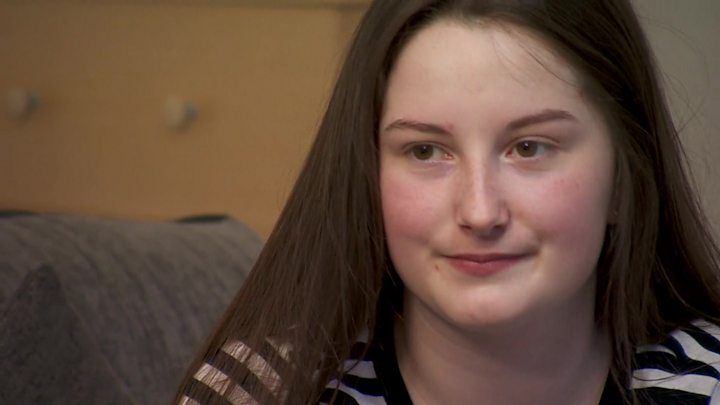The Jeremy Kyle Show axed by ITV after death of guest
The Jeremy Kyle Show has been axed by ITV after the death of a guest who took part in the programme.
Steve Dymond was found dead on 9 May a week after filming the show, during which he took a lie detector test.
ITV’s chief executive Carolyn McCall said the decision was a result of the “gravity of recent events”.
The channel had initially suspended filming of the show, which had been on the air for more than 3,000 episodes since it began in 2005.
On Tuesday, the prime minister’s spokesman called Mr Dymond’s death “deeply concerning”.

ITV’s statement in full:
“Given the gravity of recent events we have decided to end production of The Jeremy Kyle Show.
“The Jeremy Kyle Show has had a loyal audience and has been made by a dedicated production team for 14 years, but now is the right time for the show to end.
“Everyone at ITV’s thoughts and sympathies are with the family and friends of Steve Dymond.
“The previously announced review of the episode of the show is under way and will continue.
“ITV will continue to work with Jeremy Kyle on other projects.”

The Jeremy Kyle Show, was the most popular programme in ITV’s daytime schedule, with an average of one million viewers and a 22% audience share.
The pre-recorded episode Mr Dymond took part in was based on the subject of infidelity.
A member of the audience who was at the recording told BBC News that Mr Dymond “collapsed to the ground” and was “sobbing” when he failed the lie detector test.
Lie detectors were a regular fixture on the programme, which often featured disputes between partners and family members.
Critics said it put vulnerable people, often with issues of addiction and mental health, on a public platform – bringing them a level of exposure they may not have expected.

After Mr Dymond’s death, ITV took all planned episodes off the air, adding that the episode featuring Mr Dymond would never be screened.
Speaking to BBC Radio 4’s World At One programme, former ITV chief executive Stuart Prebble said the cancellation is “a good decision”, but that producers “do take seriously their duty of care”.
He said: “I think they will have known that they were in very sensitive territory. I would never have commissioned this programme if I’d had any involvement.
“The producers of these programmes walk a very thin line and and they know they do. If you are always tip-toeing close to the edge as I think this show did, perhaps it not surprising that something like this will eventually happen.
“They [ITV] have done the right thing – a speedy and effective review, and the faster these things are dealt with the better.”
A spokesman for broadcasting regulator Ofcom said: “While ITV has decided to cancel the programme, its investigation into what happened is continuing and we will review the findings carefully.”
A lot has changed in 24 hours.
Yesterday morning, ITV were minded to wait for the coroner’s verdict before deciding what to do with the show. In the past 24 hours, the evidence has grown that his appearance on the show had a devastating impact on Steve Dymond.
That evidence, and the fact that ITV is plastered across front pages once again, will have weighed heavily on the board’s mind.
The company’s director of television Kevin Lygo has tried to reinvent the broadcaster, and this programme was an anomaly within his offering: different in tone and editorial approach.
Nevertheless, it was a ratings hit, and much of its loyal audience will be despondent about it being pulled.
For all that, it’s vital to remember that this is ultimately an exceptionally sad story of a troubled individual who was found dead in his flat.

Owen Jones, author of Chavs: The Demonization of the Working Class, was among those who welcomed the decision to pull the show.
Piers Morgan, who hosts Good Morning Britain – a show Jeremy Kyle has previously guest presented – defended the host on Twitter.

On Tuesday, Charles Walker MP, a member of the all-party parliamentary group on suicide and self-harm prevention, told BBC News that Mr Dymond’s death was a “watershed moment”.
He said: “Societally, we have a responsibility for why this TV is made, it’s a reflection of ourselves that it has been made and so many people watch it.
“It’s cruel and there’s enough cruelty in the world without showing it on TV.”
Also on Tuesday, Sir Simon Wessely, who was president of the Royal College of Psychiatrists until 2017, described the show as “the theatre of cruelty”.
All previous episodes of The Jeremy Kyle Show have been taken down from the channel’s catch-up service, ITV Hub. Episodes will not air on ITV2 either.
A spokeswoman for Portsmouth coroner’s office said an inquest into Mr Dymond’s death would be likely to be opened within the next few days, following the result of the post-mortem investigation.
What does a lie detector test involve?
A lie detector test, or polygraph test, involves an examiner using various instruments to measure the subject’s reaction to a series of questions – and determine whether or not they are giving truthful answers.
According to the British Polygraph Association (BPA), two convoluted rubber pneumograph tubes are placed around the subject’s chest and abdomen to record breathing and movement.
Sensors attached to the subject’s fingers or hand monitor changes to skin resistance during the test, while a cardiosphygmograph traces changes to the subject’s blood pressure and pulse.
Various charts are then generated, which the examiner reviews to establish the test results.
The BPA says the tests are “the most reliable technique to test if someone is being deceptive to a specific issue”. (BBC)


